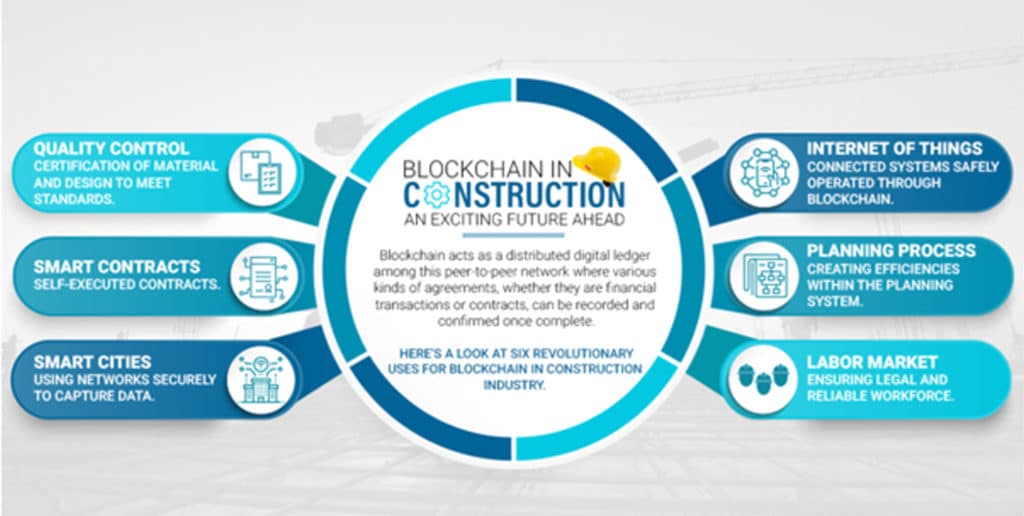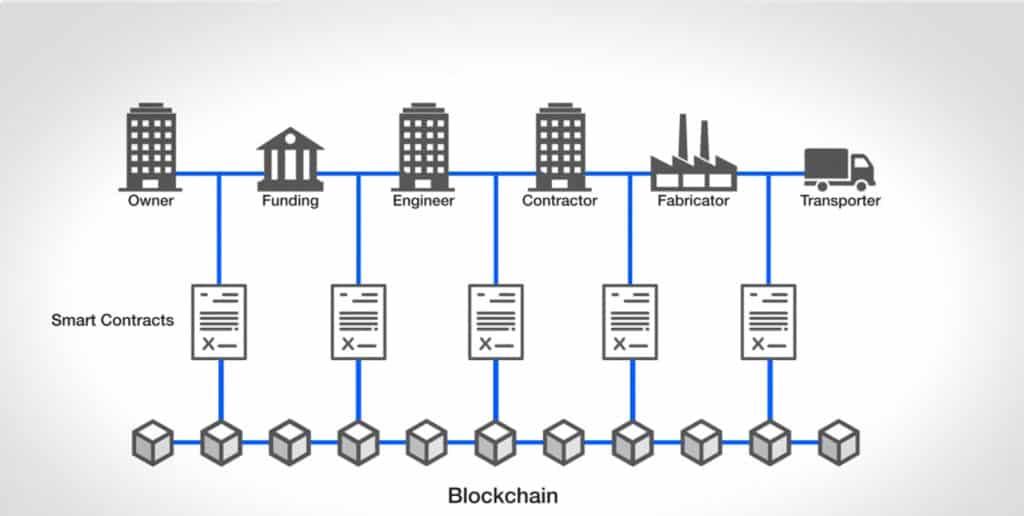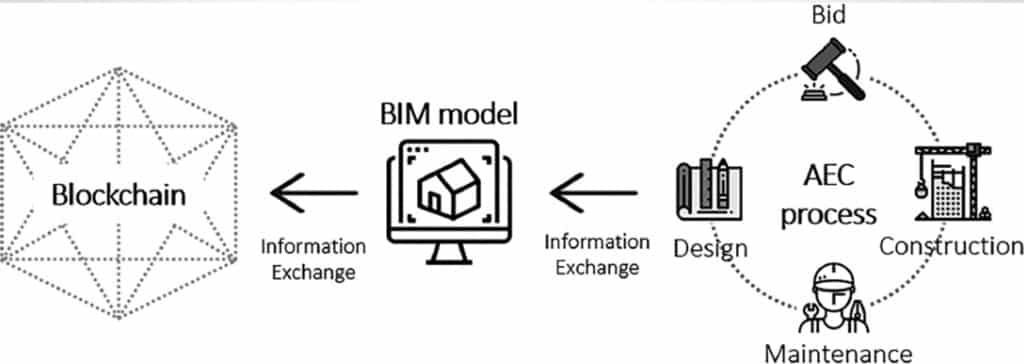The construction industry is one of the oldest industries in the world, and has been going strong for over a millennium. One of the things we always hear these days is how construction is changing. A new way of approaching building projects is emerging. It’s a process of moving from a traditional system to a more efficient, less risky one. But it’s not simply a change of vendors, people, methods and techniques.

Blockchain and the construction sector: two words you wouldn’t necessarily expect to hear in the same sentence — until now. You often hear people talking about the disruptive potential of blockchain technology and how it will change the world.
What Is Blockchain?
So, what is blockchain exactly? A blockchain is a distributed database — a place where data about transactions (which could represent the transfer of money, data or anything of value) is recorded and shared amongst participating parties and updated in real-time. These transactions are assigned a cryptographic signature and chronologically-ordered into blocks containing a hash pointer as a link to a previous block, timestamp and transaction data. The result is an ever-growing chain of valid transactions contained within transactional blocks that collectively establish clear ownership rights as early as possible, obviating the need for a trusted third party to intermediary these exchanges.
Now you might be thinking, but how does blockchain technology apply to the construction industry? Aside from benefits in the change of money, adopting such technology could also assist with a more streamlined exchange of another thing that’s crucial to the success of a construction projects.
Why is Blockchain important for the Construction Industry?
For many in the construction industry, it’s hard to imagine what blockchain could actually do for them. What does it solve? Why is it important?
The construction industry has regularly been cited as one of the world’s most fragmented, high-impact sectors. The best examples of this phenomenon are all those capital infrastructure projects across the globe that have a highly fragmented, scattered, and complex supply chain.
For example, the Cross rail project in London, with more than 700 various suppliers just from the UK, or the Burj Khalifa, with over 12,000 workers from more than 100 countries on-site at the peak of its construction.

To manage such an extended supply chain, keep track of work in progress, schedule, cost, and payments. Enormous effort and resources are needed. On top of these challenges, construction projects experience different forms of mistakes, delays, and accidents at various stages and degrees.
The lack of accountability in the construction industry has been an ongoing issue for decades. With significantly squeezed profit margins, firms are poised to find ways to cut corners and deflect blame from the resulting failures.
These are precisely the main “pain points” and areas where blockchain can help make the process more efficient, transparent, and accountable for all participants involved in the project. There are potential blockchain applications that have already been introduced and had an influence on the economy.
The three main elements with regards to the potential applications:
- Payment and Project management;
- Procurement and Supply chain management;
- BIM and Smart asset management
How Blockchain Will Change Construction Industry Forever
1: Smart contracts
Smart contracts are largely hailed as the future of the construction industry. According to the University of West England, automated contracts that reduce the necessity of intermediaries and can save time and money are poised to make their mark on the industry. Blockchain is one way that these contracts can be updated and transactions recorded.
A smart contract is a “self-executing” electronic agreement. It is still a contract, which at its core is a compilation of terms and conditions that govern the relationship between contracting parties. Smart contracts simply streamline this process by enabling the automatic enforcement or execution of certain terms/provisions upon the happening of a condition precedent, i.e., a predetermined event. The functionality of the smart contract is often explained in terms of an “if/then” occurrence: If X occurs, then Y happens. The automation is what makes this tool efficient and revolutionary.
In short, the contractual provisions are encoded within the electronic contract using an algorithm, and the contract is recorded onto the blockchain. From there, as previously agreed upon condition precedents begin to occur, the smart contract automatically begins executing the terms of the contract.
It would likely involve the creation of some sort of centralized tracking system, where the parties involved define the rules, regulations, penalties, etc., around the project that they’re working on together. The system would then work to automatically enforce these rules and regulations as the project progresses. For example, if a material was not shipped on time, the blockchain system would record that and an appropriate retaliatory action—per the pre-agreed upon rules and regulations — could be imposed. If this is a penalty fee, for instance, the transaction could occur automatically via bitcoin or cryptocurrency.

Fundamentally, implementing such as system wouldn’t just improve efficiency and resolve disputes before they even have a chance to occur, but they could also work to hold the parties involved more accountable.
2: BIM

You’ve surely heard and are already implementing various Building Information Modeling(BIM) technologies on your project sites, but when BIM and blockchain combine, it could be a dangerously effective combination. When combined, BIM and blockchain can work to greatly enhance the effectiveness of smart contracts.
For example, in BIM, the model itself can be used as part of the contract between the parties involved in the job. Therefore, all the parties would be working to match the actual physical construction on the project to the BIM model in the contract. Any deviation from the model may result in re-work or change orders. Incorporating BIM into smart contracts could also only award payment when the project is built according to the digital plans.
Combining BIM and blockchain, again, can work in holding all parties on a project accountable and creating a higher level of transparency. The combination could actually improve the effectiveness of BIM technology. Currently, BIM uses peer-to-peer networks for information sharing, but blockchain could make updates in real-time. This constant feedback and monitoring would help with transparency, lead to better overall communication and ultimately result in a higher quality of workmanship on a project.
3: Payments
Getting timely payments to all stakeholders on a project tends to be a significant challenge for many companies. Failure to pay on time can lead to conflict, and when a dispute arises, there’s the potential for a project to go south as a result.
So how can blockchain improve the payment process? Simple: By increasing security and creating traceable information thereby ensuring that subs are paid fast and the relationships with good subcontractors are fostered and not burned.
4: Supply Chain Management
If your supply chain is not in sync, then your project is going to suffer. There’s likely to be a bevy of delays, which will lead to lapses in productivity, cost overruns and an unhappy owner.
How exactly does blockchain play into supply chain management? The same way it can be integrated into many of the other aspects mentioned above of construction. Specifically, blockchain can help trace physical items from origin to final destination. It can help improve transparency, which can help all parties stay on the same page and avoid potential pitfalls and oversights.
Similarly, blockchain can help enable contractors to use unique digital-specific identifications to verify vendors and suppliers, and thereby grow their reputation over time based on how well their work is performed. These digital IDs can work two-fold, as they can also help your company verify the credentials of any subcontractors before they’re ultimately hired.
Blockchain in Construction: An Exciting Future Ahead
The implementation of blockchain enabled payment and project management systems can be a significant step which delivers and incentivizes a paradigm shift. It could also help to solve the long-standing issue of late payments and cash flow problems, giving the tool for authorities to follow up overdue payments according to relevant regulations. The transparency and collaboration enabled by this technology in major construction projects can be improved dramatically and can foster trust between all parties involved
Blockchain has a great potential to be an extremely positive force of change in the construction industry. And while the industry may not be ready yet for a full-court blockchain press, know that adoption of such is closer to reality than it is far away. Looking towards the future, blockchain is just going to be something that you’ll be hearing a lot more of—and it’s only a matter of time before it’s a necessity in any construction business.

Department: Civil
Linkedin:
SMEClabs Civil Division



Nice Blog 👍👍👍
Well written!
Thankyou
Well explained😍
Good Explained👍
Thankyou
Well explained 👏👏
Well Said
Well Explained
Thankyou
Too great to be expressed in words😍
Good Explained👍
Very informative blog 👍🏼
Thankyou
Thank u for sharing the knowledge
Good one 👍
Thankyou
Great explained 👍
Great explained 👍
Very Informativene
Thankyou
great
🥰
Well said
👍
Literally a well explained concept.
Thank you😇
Good one.
Thank you
Great ❤
Thankyou
Detailed !!!👏
Excellent work🔥
Well explained 🔥
Great 🥰
Excellent concept explained in well versed manner👍🏻Also, this is informative too.. 🙌🏻☺️Keep doing such blogs and share more valuables for us.
Sure😊
Good one😉
Thank you so much for sharing all this wonderful info with the how-to’s!!!! It is so appreciated!!!” . So much fun and easy to read!
Really Informative content. Keep it up👏
Thankyou
Thankyou for sharing this👍
😇
Easily understandable and explained very well.. This is so informative..
Thankyou
Excellent work …well explained.
Good work ❤️👍🏼
❤️❤️❤️❤️❤️
Well explained and conveyed the ideas about blockchain
Well explained
Very informative
Thankyou
Thankyou
Well done …. All the best
Thankyou
Really good approach
Good one
Thankyou
good way of presentation
Thankyou
Well explained
Best explanation 👌👌👌👌
Very informative
Nice informative content
Really good effort…..